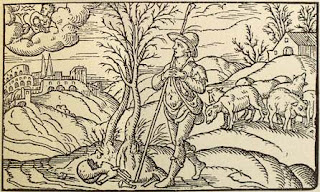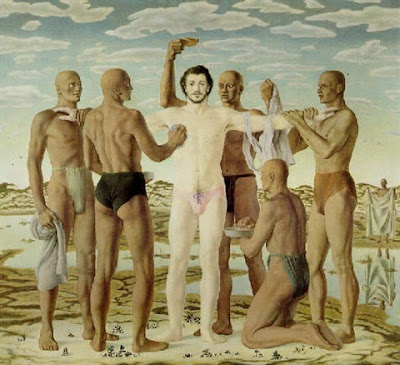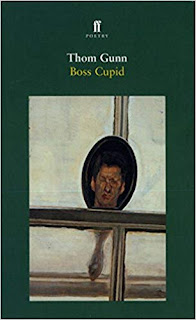Marechera and the Harrowing of Hell
The First Epistle of Peter speaks of Christ’s entry into Hell. This was an early commonplace of Christianity. Within the literary tradition, the concept became significant within Anglo Saxon literature and then Medieval literature. From the Old English hergian though the Middle English herwen, this descent by Christ became known as the “Harrowing” of Hell.
The Harrowing of Hell lasted three days…from Christ’s death on Friday to his resurrection on Sunday. In true ironical vein, Marechera picks up this detail in Black Sunlight and re-works it as his protagonist’s entry into Devil’s End. Marechera’s Christian education and his English studies at Oxford University would undoubtedly have acquainted him with the “despoiling”and its sources:
I followed him into the tunnel. We passed through huge rooms in which vague human figures were
poised in very excruciating postures. (One hung upside down and dangled by his testicles). Some were on a red hot treadmill. Some were transfixed upside down by huge nails driven into the rock passing through their ankles or their knees. Others—
“Don’t dawdle man…How long are you here for?”
"Three days."
(BS, p.53).
Seemingly, the protagonist of Black Sunlight, whose anti-self is called Christian (during the Devil’s End episode), and whose guide into Devil’s End is named Chris(t), has entered the catacombs for a period of terrorist training. Again, this is a sublime joke by Marechera, one that shows the verbal depth that underlies Black Sunlight. As Christ entered Hell to harry/attack and liberate the good souls, so the initiate in Black Sunlight enters Hell to acquaint himself with modern terrorism and methods for liberating the human spirit. This connection between terrorism and freedom of thought is represented by the mysterious “Franz’s brother”…a double who incarnates the political stance of Franz Fanon. Rather more than this exists, however, for there is a theme that once more extends the mock-Christian framework of Black Sunlight. Marechera was aware of the Surrealist writers who came to believe in writing as an “automatic” process, as something more than a learnt, conscious craft. Christian at his type-writer is literally a type for the artist and his/her struggle for words…words that take many forms and don’t always (as in the case of Black Sunlight) take the form an audience might like. What Marechera enacts within the Devil’s End episode of Black Sunlight is nothing less than a liberation of language. But Marechera pushes beyond Surrealism…more into the realm of Bataille and Bonnefoy, who believed that Surrealism had become a form of conservatism. It isn’t automatic writing, a total surrender to the unconscious , nor an example of paranoia, what Beckett described as feverish writers “covering sheets of paper with complaints against their treatment or verbatim reports of their inner voices”… it is an act of uncrucifying language, an act of terrorism upon parole and the Novel. In essence, Chapter 7 of Black Sunlight is the redemptive chapter amidst a Decalogue of Chapters— it focuses on writing, how the writer leads himself “to the slaughter, to the typewriter (BS. P.77)—to THE GREAT CUNT, the whore of Babylon, Mater-Matrix— yet seeks to harrow, violently fight the encyclopaedia that is reality, and so resurrect a different reality.




Comments